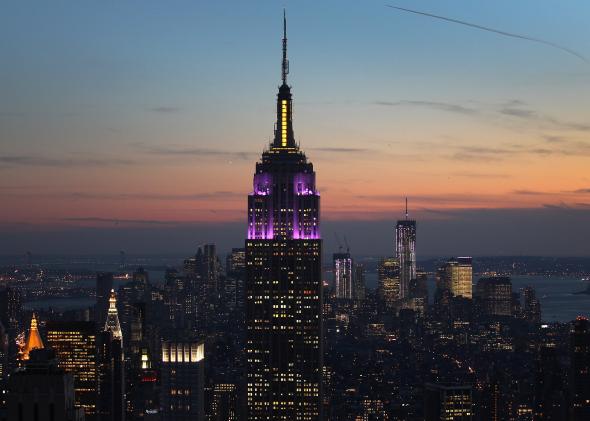New York’s Dour State of Mind

Photo by John Moore/Getty Images
Occasionally, social science reveals something new and startling. Sometimes it just confirms the obvious. The idea that New York is a city of neurotic malcontents probably falls into the latter category. But thanks to a recent study, now we have hard data to tell us that the United States' biggest metropolis is also its unhappiest.
Every year, the Centers for Disease Control and Prevention conducts a massive national survey known as the Behavioral Risk Factor Surveillance System.* Since 2005, it has asked participants, "In general, how satisfied are you with your life?" Sadly, the questionnaire doesn't leave room for a personal essay. Instead, respondents must choose "very satisfied," "satisfied," "dissatisfied," or "very dissatisfied." The multiple-choice format might not capture the vast wonder of human experience, but as Wonkblog explains, the "language is often treated as a proxy for happiness" by academics looking to quantify the concept.
In a recent draft paper, economists Edward Glaeser and Oren Ziv of Harvard and Joshua Gottlieb of the University of British Columbia used the CDC's data to find which major metro areas scored highest and lowest for joy. The vast majority of Americans report being fairly happy with life—across all five years of the survey, more than 94 percent reported being either "satisfied" or "very satisfied"—but there were some significant geographical differences. The saddest locales tended to be old, shrinking industrial cities in the Rust Belt. The most upbeat tended to be in the Sun Belt cities and places in western states such as Colorado and Utah. And despite being a thriving, global capital of culture and finance, NYC finished dead last.
At least, it did if you controlled the CDC's results both for demographic factors (age, education, and race) and for income and unemployment (basically, if you pretended every city looked and earned the same). These controls struck me as a strange way of looking at the issue. Wealthy people tend to be happier people, so by controlling for earnings, you're cutting an important part of well-being out of the picture. That makes sense if you're a researcher trying to calculate exactly how much of life satisfaction is determined by finances and how much is determined by other factors. But for journalists trying to figure out which cities are actually happiest in real life, it's a bit like ranking NFL teams while ignoring their win-loss records.
So I decided to check out the research team's full data set, without all the fancy adjustments. Turns out, New York still takes the grand prize for big-city misery. Based on its raw happiness scores, the metro area was the third unhappiest overall, finishing just above Jersey City, New Jersey (which is basically an extension of Manhattan's financial district), and ever-woeful Gary, Indiana. Among city regions with a population of at least 1 million, New York came in last. The same pattern held if you adjusted the data for demographic characteristics but not income. Any way you look at the numbers, the New York state of mind appears to be one of personal dissatisfaction.
But hey, life in Los Angeles doesn't seem so thrilling either. Check out the interactive table below for a happiness ranking of America's large cities.
*Correction, Aug. 5, 2014: This post originally misidentified the Centers for Disease Control and Prevention as the Center for Disease Control.

